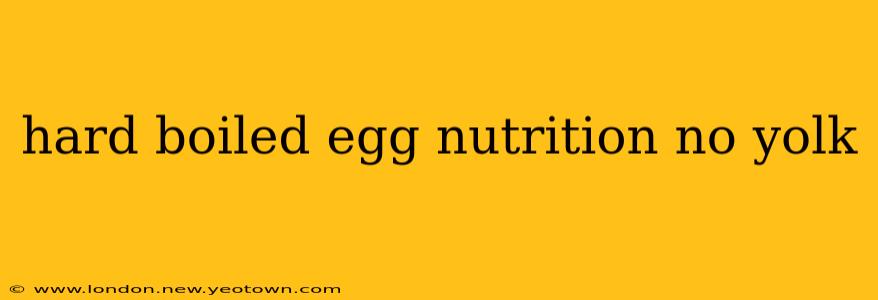Let's be honest, the creamy, golden yolk is often the star of the show when it comes to hard-boiled eggs. But what about the egg white? Many people wonder about the nutritional value of just the egg white, particularly those watching their cholesterol or calorie intake. This article dives deep into the nutritional profile of a hard-boiled egg white, separating the myths from the facts.
Imagine this: you're preparing for a busy day, needing a quick, protein-packed breakfast. You grab a hard-boiled egg, meticulously peel it, and – ahem – discard the yolk. Are you missing out on crucial nutrients? Let's unravel this culinary mystery.
What are the nutritional benefits of hard-boiled egg whites?
The egg white, the clear, viscous part surrounding the yolk, is a nutritional powerhouse in its own right. It's essentially pure protein, low in fat and cholesterol. While the yolk contributes a wealth of vitamins and minerals, the egg white shines when it comes to its high-quality protein content. Think of it as nature's perfectly packaged protein snack. It provides essential amino acids, the building blocks our bodies need to repair and build tissues, support immune function, and produce enzymes and hormones.
This makes it a fantastic choice for those focusing on muscle building, weight management, or simply maintaining a balanced diet.
How many calories are in a hard-boiled egg white?
A single large hard-boiled egg white typically contains around 17 calories. Compare this to the entire egg (approximately 78 calories), and you can see the significant difference. This low-calorie nature makes it a great addition to diets aimed at weight loss or maintenance.
How much protein is in a hard-boiled egg white?
The protein content is where the egg white truly excels. One large hard-boiled egg white boasts roughly 3.6 grams of protein. This substantial amount contributes significantly to feelings of satiety, keeping you fuller for longer and potentially reducing overall caloric intake throughout the day.
Is there any fat or cholesterol in a hard-boiled egg white?
The beauty of the egg white lies in its minimal fat and cholesterol content. Essentially, it’s negligible. Unlike the yolk, which contains most of the egg's fat and cholesterol, the white is virtually fat-free, making it a perfect choice for those watching their cholesterol levels.
Are there any vitamins and minerals in hard-boiled egg whites?
While the yolk contains most of the vitamins and minerals in the egg, the egg white still provides some essential nutrients. It offers trace amounts of certain B vitamins, like riboflavin and niacin, vital for energy production and cell function. It's important to remember, however, that these amounts are significantly lower compared to those found in the yolk.
Is eating only egg whites good for you?
While egg whites offer excellent protein and are low in calories and fat, it's not advisable to consume only egg whites regularly. The yolk is packed with essential nutrients like choline, vitamin D, vitamin A, and iron, all vital for overall health. A balanced approach, incorporating both yolk and white, is always recommended for optimal nutrition.
Conclusion: The Whole Egg Story
While the hard-boiled egg white offers a lean protein boost with minimal calories and fat, the yolk plays a crucial role in delivering a full spectrum of essential nutrients. Stripping the egg of its yolk limits your intake of vital vitamins and minerals. A balanced diet should always include whole foods, ensuring you get the complete nutritional package each ingredient offers. Enjoy your hard-boiled eggs – yolk and all!

